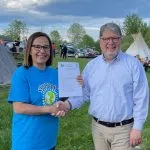
Walking the line
“My goal is to raise consciousness and have people think about the future,” said Beeds. “Our children desperately need us to pay attention to the earth and waters, to the crisis we’re collectively facing. That’s what drives me.”
The Indigenous scholar from Trent University is of nêhiyaw, Scottish-Métis, and Caribbean ancestry and her thesis is on water walking and Indigenous peoples’ relationships and knowledge of water.
“Basically, I’m looking at how colonial processes are linked to the destruction of the waters, the earth, and the rest of Creation,” said Beeds. “But, as Indigenous people, our ancestors have left us with knowledge and stories that show us how to shift our consciousness to help us remember our responsibilities.”
Water walking, according to Beeds, is a contemporary application of age-old ceremonies, traditions, and cultural understandings of the land and being responsible for the earth.
Water walkers will start at the source of the water (a glacier, for example) and walk, with a copper pail filled with water from the source. They will continue to travel the entire length of the body of water. As they walk, prayers and songs acknowledge the water is life and deserves our respect, love, and protection.
The practice was created in part by Beeds’ mentor, the late Josephine Mandamin.
“I see it as a research methodology as well, because when we’re walking, people know who we are now,” said Beeds. “Almost every Indigenous community we pass by invites us in. They recognize our movement is for them and their children.”
Last year, Beeds water walked about 1,100 kilometres (kms) in 36 days. Twice she’s made the 3,000-km trek around the Great Lakes. She thinks she’s walked 7-to-8,000 kms, for the water, which is a drop in the bucket compared to her mentor who walked about 30,000 kms.
“Ultimately, what my work is about is an urgent cry of warning,” said Beeds. “Once the water is gone, it can’t be replaced. My work is sounding the alarm, saying to our own people, ‘We have literally everything we need inside our own ways of knowing and being.’ The Elders that came before us, our ancestors who have walked the earth left us everything we need. We just have to pick it up.”
In Saskatchewan, the most significant water-related issue is water scarcity as a result of climate change and human neglect. Water scarcity and food scarcity are closely connected because humans and wildlife all rely on clean drinking water.
Beeds says each community needs to start implementing a climate change emergency plan.
“I ask people if they remember what it was like when people were going crazy over toilet paper,” she said. “Now, what are people going to do when it’s not toilet paper that’s disappearing, but water? It’s going to be a thousand times worse.”
Following the completion of her dissertation, Beeds will be doing anything she can to raise awareness of water-related issues, be it speaking engagements, working with youth, attending ceremonies, or even helping to promote the revitalization of language and culture, which holds many of the keys to our survival, she said.
“We need to put aside our differences and begin to genuinely work together, because there will be a time when our children will depend on the plans and movements we will put in place now,” she said.

